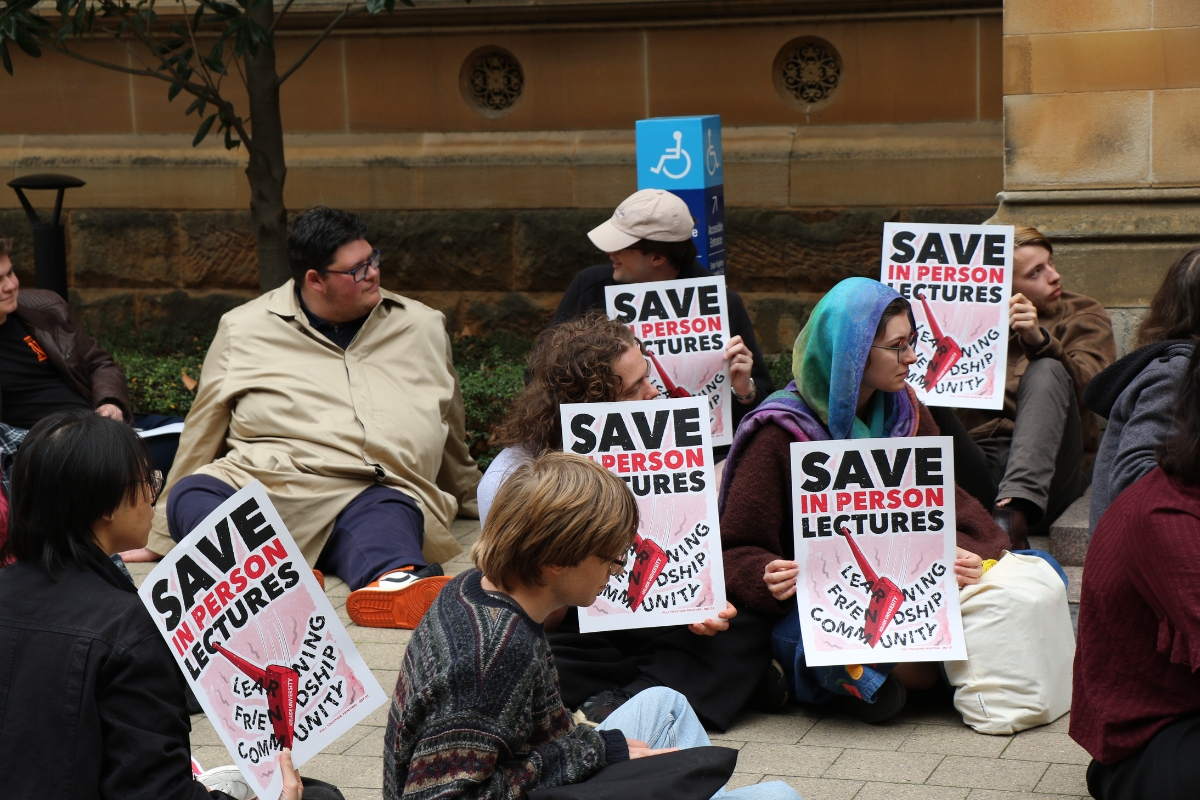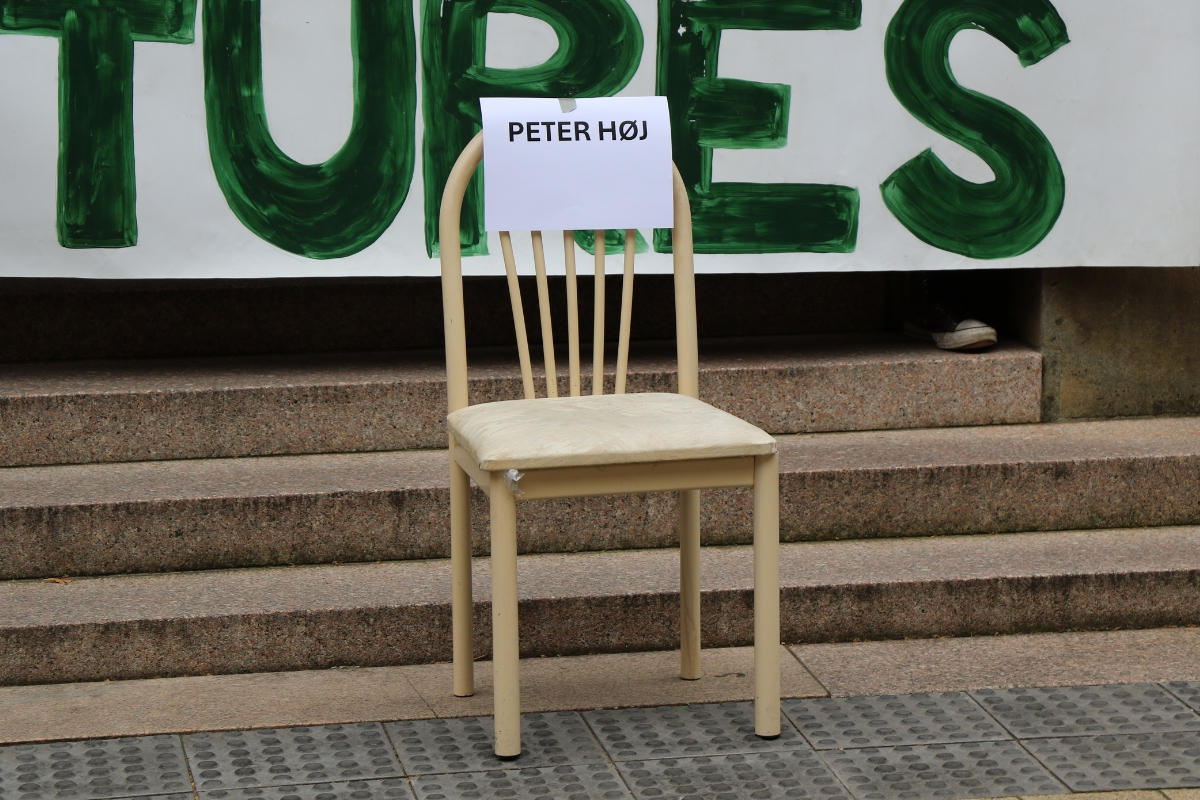‘I could get that on YouTube for free’: Students protest uni’s digital future
Students and a university lecturer have staged a sit-in outside the office of University of Adelaide vice-chancellor Peter Høj to protest the replacement of face-to-face lectures, but the university said it had no plans to scrap them.

More than 30 people, mainly students, braced the wet weather yesterday to stage a sit-in outside the University of Adelaide’s Mitchell Building against what they see as the planned replacement of face-to-face lectures with “rich asynchronous digital activities” at the new Adelaide University, as first revealed by InDaily in September 2024.
In a media release, campaign organisers said they were calling for the university to “continue in-person lectures”, to “consult sufficiently with students and staff on the university’s transition plan” and to “commit to increased transparency”.
However, in a statement to InDaily, an Adelaide University spokesperson said the new university has no plans to remove face-to-face lectures.
“Adelaide University is not removing face-to-face lectures – and that is something we have consistently said,” the spokesperson said.
“Our students deserve dynamic, collaborative, and supportive learning environments and the University will offer both on-campus and online lectures to enable the best mode of delivery, which will vary by course and discipline.
“To support enrolments and to ensure a successful transition to Adelaide University, individual study plans are being provided. They will outline the student’s new Adelaide University program, previously completed courses and credit, and the remaining courses needed to complete their degree.
“Adelaide University has engaged more than 3,000 students, academics and teaching innovation experts to design the Adelaide University curriculum and courses, including dedicated focus groups.”
“Save Our Lectures” protest organiser James Scalzi told InDaily that the group believes face-to-face learning must be prioritised at the new university.
You might like
“In an ever increasingly digital world where young people are really struggling with community and connection, the university taking away something like in-person lectures is really detrimental to students’ ability to connect with each other, but also with the lecturer,” he said
“I believe that there’s a lot of value in asking questions in person and having that face-to-face connection with people.”
Scalzi said the loss of lectures would diminish his university experience and that their proposed replacement with a digital learning component is insufficient.
“I’m paying upwards of $10,000 a year to be here, and if I wanted to learn through a screen, I could get that on YouTube for free,” he said.

Other speakers at the protest included University of South Australia journalism lecturer Dr Chrisanthi Giotis and University of Adelaide Greens club president Val Caceres Galvez, while protest organisers read out a statement on behalf of Greens candidate Katie McCusker.
Giotis said she was extremely nervous to speak out but had to because of the importance of university lectures.
“Congratulations on being here, because you worked hard to get into university, and you have the right to go through the right of passage, which is a university lecture. It’s one unique aspect of being at university,” she said.
“Society needs lectures. We are social beings. Human beings have evolved through social learning – that’s a fact. So, while there is a role for digital learning – 100 per cent, yes – all the research shows that it works best, is richest when it’s a supplement, not a replacement.”
A statement was then read out on McCusker’s behalf, who organisers said was unable to attend due to “draconian” measures introduced to prevent non-university members taking part in protests at the university in response to a pro-Palestinian encampment last year.
Stay informed, daily
McCusker said she stood in solidarity with the campaign, which was “about safeguarding the very essence of what a university experience should be”.
“This is not innovation. It’s a cost-cutting exercise dressed up as progress, and it risks turning our universities into degree factories rather than vibrant centres of learning and community; to think about the rich experience of university life being reduced to a computer screen with a gallery view of black squares – dry, dull, disengaged – it’s not just sad, it’s terrifying” she said.
Sociology student Galvez said she had only been offered in-person lectures for one class during her four years at university.
“Face-to-face lectures and the ability to meet your professors and your fellow students are incredibly important,” she said.
“Like I said, it’s about enhancing our learning, about building community and relationships that are going to sustain our future careers and endeavours.”
Following the protest, a handful of attendees set up camp outside the Mitchell Building, where University of Adelaide vice-chancellor Peter Høj has his office.
Event organisers placed a chair bearing the vice-chancellor’s name, stating that they would not leave until Høj came out and gave them a clear answer about what would replace lectures at the new university.
“Save Our Lectures” organiser Poppy Pilmore said the group continued to camp outside the Mitchell Building late into the evening until they were moved on by security guards.
“We were told that we must leave within 15 minutes, and they threatened to call the police if we didn’t under trespassing, ” they said.
“We believe these are extremely draconian and authoritarian measures for a peaceful protest. We are a group of students who just want to have a say in our education. This reactionary measure will not stop us.”
Pilmore said “Save Our Lectures” continued their sit-in this morning until police were called and requested the group take down their tents, which they complied with.
However, Pilmore said they would continue to peacefully protest in front of the Mitchell Building.
“We will still have a chair with Peter Høj’s name on it, and we will be waiting to see if he decides to negotiate on keeping in-person lectures across all faculties next year,” they said.
SAPOL was contacted for comment, but did not respond by publication time.
Adelaide University did not directly respond to claims that it called the police on protestors.

Want to see more stories from InDaily SA in your Google search results?
- Click here to set InDaily SA as a preferred source.
- Tick the box next to "InDaily SA". That's it.








